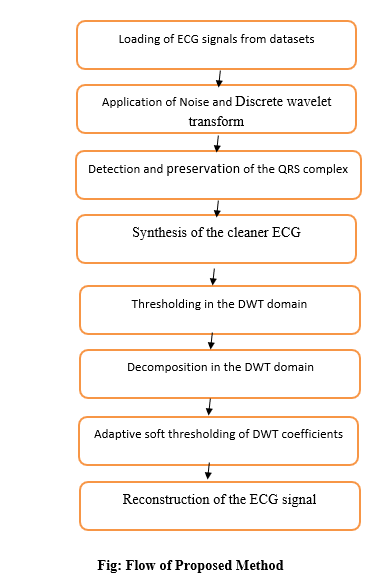Denoising of ECG signals Based on Noise Reduction Algorithms in EMD and Wavelet Domains
Objective
The objective of this research is to investigate and develop efficient denoising methods for Electrocardiogram (ECG) signals by exploring and implementing noise reduction algorithms in both the Empirical Mode Decomposition (EMD) and Wavelet domains.
Abstract
This paper presents a new ECG denoising approach based on noise reduction algorithms in empirical mode decomposition (EMD) and discrete wavelet transform (DWT) domains. Unlike the conventional EMD based ECG denoising approaches that neglect a number of initial intrinsic mode functions (IMFs) containing the QRS complex as well as noise, we propose to perform windowing in the EMD domain in order to reduce the noise from the initial IMFs instead of discarding them completely thus preserving the QRS complex and yielding a relatively cleaner ECG signal. The signal thus obtained is transformed in the DWT domain, where an adaptive soft thresholding based noise reduction algorithm is employed considering the advantageous properties of the DWT compared to that of the EMD in preserving the energy in the presence of noise and in reconstructing the original ECG signal with a better time resolution. Extensive simulations are carried out using the MIT-BIH arrythmia database and the performance of the proposed method is evaluated in terms of several standard metrics. The simulation results show that the proposed method is able to reduce noise from the noisy ECG signals more accurately and consistently in comparison to some of the stateof-the-art methods.
NOTE: Without the concern of our team, please don't submit to the college. This Abstract varies based on student requirements.
Block Diagram

Specifications
Software: Matlab 2020a or above
Hardware:
Operating Systems:
- Windows 10
- Windows 7 Service Pack 1
- Windows Server 2019
- Windows Server 2016
Processors:
Minimum: Any Intel or AMD x86-64 processor
Recommended: Any Intel or AMD x86-64 processor with four logical cores and AVX2 instruction set support
Disk:
Minimum: 2.9 GB of HDD space for MATLAB only, 5-8 GB for a typical installation
Recommended: An SSD is recommended A full installation of all MathWorks products may take up to 29 GB of disk space
RAM:
Minimum: 4 GB
Recommended: 8 GB
Learning Outcomes
· Introduction to Matlab
· What is EISPACK & LINPACK
· How to start with MATLAB
· About Matlab language
· Matlab coding skills
· About tools & libraries
· Application Program Interface in Matlab
· About Matlab desktop
· How to use Matlab editor to create M-Files
· Features of Matlab
· Basics on Matlab
· What is Signal Processing?
· About Signal Processing
· Introduction to Signal Processing
· How analog and digital signal is formed
· Importing the signal via signal acquisition tools
· Analyzing and manipulation of signals.
· Phases of signal processing:
· Acquisition
· Signal enhancement
· Signal restoration
· Medical Signal Processing
· Medical Signal Analysis
· Medical Signal Diagnosis
· Filtering techniques
· Machine Learning Algorithms
· Deep Learning Algorithms etc.
· How to extend our work to another real time applications
· Project development Skills
o Problem analyzing skills
o Problem solving skills
o Creativity and imaginary skills
o Programming skills
o Deployment
o Testing skills
o Debugging skills
o Project presentation skills
o Thesis writing skills





 Paper Publishing
Paper Publishing
